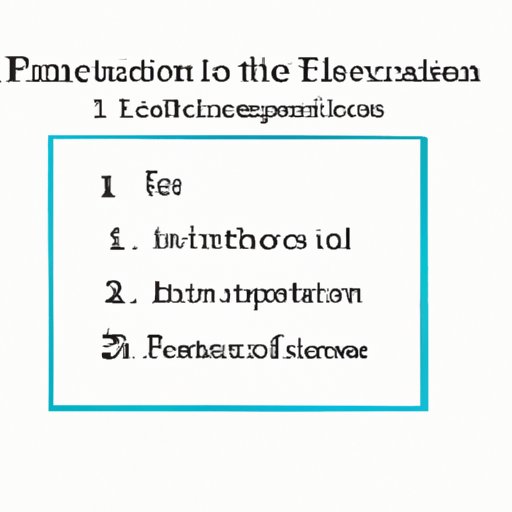
I. Introduction
When a loved one passes away, one of the inheritances they may leave behind is money. However, receiving inheritance money is not as simple as it seems. The process is often complex and may take up a significant amount of time. That’s why we’ve created this guide to help you understand how long it takes to get inheritance money and to offer some practical advice along the way.
II. Defining Inheritance Money
Simply put, inheritance money is the money that a person passes on to their heirs or beneficiaries. In most cases, the executor of the will distributes the money to the heirs or beneficiaries after all the debts, taxes, and other bills associated with the estate have been paid.
Before distribution, however, a legal process called probate must take place. Probate is the process of validating a person’s will and making sure all the legal steps are followed. In the United States, probate laws differ from state to state, but most states follow similar rules and procedures. Executors play a vital role in the probate process by overseeing the distribution of assets after probate has been granted.

III. Factors that Determine the Time it Takes to Receive Inheritance Money
Several factors influence the duration of obtaining inheritance money, and these factors differ in various states and countries. They include:
- Complexity of the estate: Inheritance distribution may take longer if the estate has many assets, properties, or businesses.
- Type of assets involved: The nature of the assets (real estate, stocks, etc.) affects how long it takes to distribute the inheritance.
- Location of property: The location of the estate, especially if it spans different states or countries, plays a significant role in the duration of the process.
- Debts of the deceased person: Unresolved debts could lead to creditors making claims on the estate.
IV. The Timeline for Receiving Inheritance Money
The timeline for receiving inheritance money is not set; it varies from one case to another, depending on the factors mentioned above. However, below is a basic overview of the different stages of the inheritance process and how long each of them takes:
- Month 1: Submit the will to probate court, and begin the process of validating it. Notify banks, investment management companies, and other financial institutions of the passing, and request necessary documents.
- Months 2–3: Identify and value the estate’s assets, pay outstanding debts, and file federal estate tax returns.
- Months 4–6: Resolve any disputes among heirs, and distribute assets to beneficiaries.
- After month 6: Finalize the estate’s accounts, income tax returns, and disburse the final share of the estate. Close the estate.
If there is no will, the process may become more complicated. An executor will need to administer the estate and distribute its assets according to the applicable intestacy laws. The process of probate is similar regardless of the existence of a will, but the sequence may be different.
V. Delays That May Affect Receiving Inheritance Money
Several issues can arise when dealing with inheritance matters. The following are some roadblocks that may delay the process:
- Disputes Within the Family: Disputes among family members can significantly bog down the inheritance process. It is common for individuals to contest a will, which in turn, ends up delaying the process.
- Legal Challenges: When a family member contests the legality of the will, the process can take longer, leading to further complications.
- Outstanding Debts: This may lead to legal issues, especially when a creditor makes a claim on the decedent’s assets.
VI. Ways to Speed Up The Inheritance Process
While the inheritance process length may seem uncertain, there are several things you can do to expedite it:
- Hire an Attorney: Hiring an experienced attorney can help streamline the inheritance process, especially if you have little knowledge about the process.
- Estate Planning: Estate planning entails putting measures in place to ensure a smooth inheritance process. This includes preparing your will in advance and dividing your assets in a legally sound manner.
- Communication: Communicate openly with the executor/personal representative to get updates on the inheritance process.
VII. The Emotional Impact of Waiting for Inheritance Money
The waiting game associated with receiving inheritance money can have a significant psychological impact on a person. Feelings of frustration, anger, doubt, and sadness are common. It’s essential to have a support system in place and keep yourself informed throughout the process.
VIII. What to Do if You Believe You Are Entitled to Inheritance Money
If you believe you are entitled to inheritance money but did not receive it, you must take action as soon as possible. Speak to a probate lawyer and take the necessary legal steps to claim your inheritance.
IX. Conclusion
Inheritance distribution is never straightforward, and varies depending on various factors. The process could take a few months or even years. By understanding the process, the factors that affect its duration, and taking some practical measures, you can streamline the inheritance process. Be sure to take care of your emotional well-being and speak to professionals if you feel overwhelmed.





